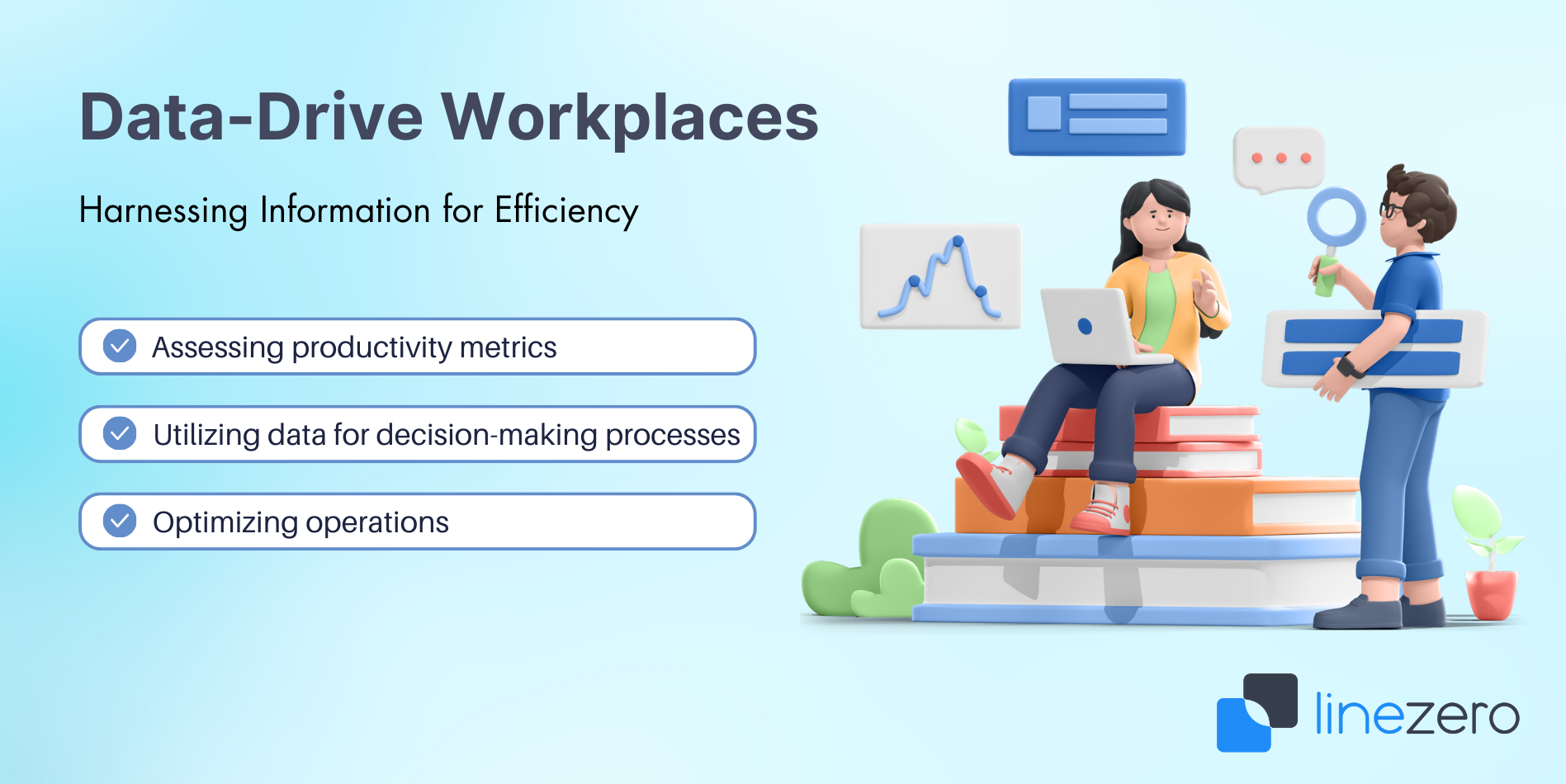At LineZero, we recognize that the workplace is transforming at an unprecedented pace. Innovations like Copilot for Microsoft 365, the advancements of generative AI, and the immersive realms of VR and the Metaverse are not just changing how we work; they're redefining the very fabric of our workspaces.
This blog will explore 8 important changes that are shaping the future of work. We'll give you insights and ideas to help you succeed in this changing world. These changes include new ways of working, using smart technology, the gig economy, being more environmentally friendly, making decisions with data, and being fair to everyone. We'll explore these shifts to help you understand and prepare for the future of work. It's a journey we're all on, and together, we can make it a positive one.
In this blog, you'll find:
🌐 1. Evolving Work Environments: Remote and Hybrid Models
🤖 2. Intelligent Automation: AI's Role in the Workplace
💼 3. The Gig Economy and Freelance Revolution
🎓 4. Upskilling for Tomorrow: The Imperative of Lifelong Learning
🌿 5. Sustainable Practices in the Modern Workplace
👫 6. Diversity and Inclusion as Business Imperatives
🌪️ 7. Adapting to Demographic Shifts in the Workforce
📊 8. Data-Driven Workplaces: Harnessing Information for Efficiency
Now, let's dive into the first shift:
1. Evolving Work Environments: Remote and Hybrid Models
There is a major change happening in the traditional office model, as more and more companies are embracing remote and hybrid work setups. According to a survey conducted by Forbes Advisor, 12.7% of full-time employees work from home, while 28.2% of employees have adapted to a hybrid work model that combines both home and in-office work. It’s an interesting evolution in how we approach our work environments.
This shift brings with it its own set of challenges. Organizations must find a way to balance the benefits of remote work with the importance of face-to-face collaboration among their staff members.
The Rise of Hybrid Work Culture
The trend of the hybrid work model, which combines remote working and on-site attendance, is gaining popularity. This approach allows employees to have a say in their preferred working schedule and location, enabling them to find a balance between personal well-being and job responsibilities.
As more people return to physical offices, organizations must adapt their operational structures to accommodate this shift and facilitate seamless collaboration between in-office workers and those who continue with remote arrangements. It is crucial for companies to promote the smooth integration of these two modes while ensuring efficiency for all individuals involved.
Remote Working Technologies
The advancement of remote working tools, like cloud-based systems and virtual meetings, has played a vital role in enabling the practice of remote work. These technologies improve communication effectiveness and enable companies to transition from traditional offices to shared workspaces that cater to employees who are based remotely, thereby fostering a more adaptable workplace setting for all.
Overcoming Remote Work Challenges
Remote work brings with it a variety of benefits, but it also poses distinct obstacles. To ensure the continued success of remote work arrangements, organizations must develop effective methods to tackle these challenges. Some methods to do this include time management and maintaining a healthy balance between personal and professional life. They need to address issues like isolation that can arise from working remotely in order for their employees to thrive.
It's recommended that organizations create an online space where employees can "get together" virtually, fostering a sense of camaraderie and collaboration. Employee Experience Platforms (EXPs) can serve as ideal social spaces online, allowing teams to connect, communicate, and build relationships. These platforms help alleviate feelings of isolation and enhance remote work experiences.

2. Intelligent Automation: AI's Role in the Workplace
As we look towards the future, it is crucial to understand the implications of artificial intelligence (AI) becoming an integral part of our workplaces. According to a report by McKinsey, automation and AI are transforming businesses, contributing to productivity, and addressing societal challenges, from health to climate change.
However, these technologies will also reshape the nature of work itself. Machines will carry out tasks previously done by humans, complement human work, and even perform tasks beyond human capability. This transformation will lead to changes in occupations, and workers will need to acquire new skills to adapt to the increasingly capable machines alongside them in the workplace. At the same time, the presence of AI has the potential to improve job opportunities, create new roles, and fundamentally change how we work, from tasks requiring creativity to decision-making processes.
Generative AI in Creative Jobs
The emergence of generative AI tools, as highlighted by the World Economic Forum (WEF), has brought a transformative change to creative roles. According to the WEF, these advancements assist in idea generation and task execution, thereby boosting human creativity and expanding the scope of the creative process. With continuous progress, these tools hold tremendous potential for increasing productivity and igniting novel concepts while acknowledging that human innovation remains essential.
AI-Assisted Decision Making
The use of AI in decision-making is growing in importance. One key role is its ability to analyze large amounts of data without any mistakes, freeing up teams to concentrate on tasks relevant to their respective areas. This results in faster and more accurate decisions being made consistently.
By helping with decision-making, AI helps boost efficiency across various industries, empowering businesses to make well-informed choices. Its capabilities allow for quick analysis and processing of information, leading to better outcomes overall.
Ethical Considerations of AI at Work
Integrating AI in the workplace offers many benefits, but it also brings about ethical concerns surrounding data privacy and algorithmic bias. To maintain trust and promote fair practices, it is essential for organizations to carefully consider and address these implications as AI becomes more prevalent in the workforce.
By implementing transparent and ethical AI practices, organizations can harness the full potential of AI while ensuring that it aligns with societal values and respects individual rights.
.png?width=2000&height=513&name=Corporate-AI%20Impact%20%20(1).png)
3. The Gig Economy and Freelance Revolution
The rise of the gig economy and the freelance revolution is shaping the future of work, particularly in the service industry. This trend offers workers flexibility and employers cost-saving options through on-demand, short-term employment opportunities. This change also poses regulatory and legal challenges that need to be addressed.
Flexibility and Freedom for Workers
The gig economy provides workers with the ability to have control over their work schedule, location, and methods of working. This brings about a sense of flexibility and autonomy.
There may be little or no job stability in this type of work arrangement as well as limited access to employment benefits. As such, it is important for individuals to find a balance between taking advantage of opportunities in the gig economy while also ensuring some level of job security.

Employers Leveraging Freelance Talent
The gig economy presents employers with the opportunity to access a wide range of talent on a per-project basis, enabling them to utilize specific skills without the obligations of permanent employment.
Regulatory and Legal Frameworks
With the growing popularity of the gig economy, there have been efforts to introduce regulatory and legal measures for protecting the rights and well-being of workers in this sector. Existing laws are not thorough enough, and many gig workers are still considered independent contractors, underscoring the necessity for additional reforms.
4. Upskilling for Tomorrow: The Imperative of Lifelong Learning
In the ever-evolving world of technology, continuous learning and honing new skills have become essential requirements for achieving success in the future workplace. With a plethora of options such as online educational platforms and company-sponsored training programs, individuals now have easier access to personalized learning opportunities that cater to their specific needs as professionals.
Embracing Online Education Platforms
E-learning platforms are an ideal choice for individuals looking to improve or acquire new skills as they offer convenience and adaptability. These platforms have a simple interface and collaborative tools and can be accessed from multiple devices. All of which makes the process of gaining knowledge and abilities more efficient.
In-House Training Initiatives
An alternative way to promote professional growth is through in-house training programs. These initiatives can keep employees informed about the latest industry trends and emerging technologies, enabling them to stay updated on current practices. Customizing the program to tackle specific challenges within the organization also has potential benefits, such as enhancing internal communication and elevating overall business performance.
Employee Experience Platforms (EXPs) can serve as effective tools for hosting and facilitating training programs, fostering collaboration, and sharing knowledge among employees, whether they are working in the office or remotely. These digital environments offer a seamless and engaging way to deliver training and development opportunities, making them particularly advantageous in the modern workplace.
The Role of Employers in Employee Growth
The employee value proposition and employee retention are positively affected by employers promoting personal growth and development. By showcasing a genuine interest in their employee’s career goals and offering opportunities for training and acquiring new skills, employers can cultivate an environment that prioritizes continuous learning. This approach not only strengthens the employer-employee relationship but also aids in retaining valuable staff members.
5. Sustainable Practices in the Modern Workplace
Looking ahead to the future of employment, it is becoming increasingly crucial for businesses to prioritize sustainable practices in their workplaces. This includes efforts such as creating a greener office setting, encouraging eco-friendly behaviours among employees, decreasing environmental harm and enhancing employee wellness.
Greening the Office Environment
Efforts towards eco-friendly office practices are essential in minimizing environmental harm and aiding businesses in managing their expenses. Businesses can establish a sustainable work environment by adopting strategies such as reducing paper usage, optimizing thermostat settings, and promoting environmentally friendly transportation options. These initiatives not only benefit the environment but also help companies control costs associated with running an office.
Forward-thinking organizations like LineZero, a certified B Corp, understand the significance of adopting sustainable office practices.
Encouraging Eco-Conscious Behaviors
Promoting eco-friendly actions among staff is also a crucial element in establishing an environmentally sustainable workplace. By introducing initiatives for recycling, conserving energy, and advocating for sustainable modes of transportation, employers can cultivate a mindset of environmental accountability within their organization.
Sustainability as a Corporate Value
For companies, sustainability should not be limited to stand-alone initiatives but ingrained as a fundamental principle. By adopting a holistic perspective and actively involving stakeholders, organizations can effectively integrate sustainable practices into their operations and brand identity.
6. Diversity and Inclusion as Business Imperatives
The future workplace will see a shift towards prioritizing diversity and inclusion as crucial business objectives. In order to foster a supportive and inclusive environment for all employees, it is essential for businesses to focus on building diverse teams and implementing policies that promote inclusivity. This requires concerted efforts from companies to create an environment where everyone feels welcomed and valued.
Building Diverse Teams
Utilizing diverse teams can bring a multitude of advantages to businesses, such as enhanced:
-
Ingenuity and decision-making
-
Overall corporate performance
-
Creativity and problem-solving
-
Employee satisfaction and engagement
-
Varied perspectives and ideas
By recognizing the distinct requirements of different age groups within the workforce, companies have the opportunity to harness the strengths offered by diversity in their teams. This fosters an inclusive environment that not only promotes innovation but also improves understanding with diverse customer bases.
Inclusive Policies and Practices
Establishing inclusive policies and practices is crucial in promoting a supportive and accepting workplace for all staff members. Employers can cultivate an atmosphere of inclusivity by utilizing language that embraces diversity, establishing safe zones, and fostering open lines of communication between employees. These measures are essential for creating an environment where every individual feels valued and respected.
In addition to these practices, utilizing content repository features available in Employee Experience Platforms (EXPs) can further enhance inclusivity efforts. These platforms offer convenient and accessible ways to store and share important policies and documents, ensuring that all employees have easy access to vital information that promotes an inclusive and equitable workplace. By leveraging such technology, organizations can reinforce their commitment to fostering diversity and inclusion throughout the company.
Measuring Progress in DEI Efforts
Assessing the advancement of diversity, equity, and inclusion (DEI) initiatives is essential for ongoing corporate development and responsibility. Through collecting and evaluating DEI data, companies can guarantee their commitment to future diversity goals and make well-informed choices in enhancing inclusivity within their organization.
7. Adapting to Demographic Shifts in the Workforce
To prepare for the future of work, it is crucial to adjust and accommodate demographic changes within the workforce. This includes effectively managing teams composed of different generations as well as developing strategies to attract global talent. Businesses must be proactive in navigating these shifts and utilizing them to their advantage.
Managing Multigenerational Teams
Effectively managing teams composed of multiple generations can present various challenges, including:
-
Acknowledging and meeting the distinct needs and expectations of each age group.
-
Cultivating an inclusive workplace culture that values all team members’ contributions.
By addressing these specific obstacles while also taking into account additional factors, companies can establish a positive and efficient work environment for their diverse teams.

Global Talent Strategies
In today’s global market, the demand for top talent has made it crucial for businesses to have effective talent recruitment strategies. This involves setting clear objectives and requirements, understanding potential sources of talented individuals across different regions, and offering competitive compensation packages that make them an appealing employer in an international context.
8. Data-Driven Workplaces: Harnessing Information for Efficiency
The future workplace will rely heavily on data to shape our professional environment. Data usage in the following ways will be crucial:
-
Assessing productivity metrics to detect potential areas for enhancement
-
Utilizing data to guide decision-making processes and strategic planning
-
Optimizing operations by identifying inefficiencies through thorough analysis of collected data
Workplaces driven by comprehensive use of information aim to achieve efficiency and effectiveness.

Conclusion
In this exploration of the future of work, we've delved into ten pivotal shifts that are reshaping our careers and workplaces. From the rise of remote and hybrid work models to the integration of artificial intelligence, the gig economy, sustainable practices, and the importance of diversity and inclusion, the modern world of work is evolving at an unprecedented pace.
As we navigate these transformative shifts in the world of work, one thing remains clear: adaptability and lifelong learning are essential. Embracing data-driven decision-making, embracing sustainability, and effectively managing diverse teams are all critical factors in achieving success in this dynamic landscape.
By understanding and embracing these changes, we can not only thrive in the ever-evolving professional world but also contribute to creating workplaces that are more diverse, inclusive, and sustainable, setting a positive course for the future of work.
Do You Want To Elevate Your Workplace Culture & Employee Experience?
At LineZero, we specialize in building exceptional company cultures through innovative digital tools and expert EX consulting.
Enhance your employee experience with LineZero & discover our solutions today!

February 06, 2024


.png?width=520&height=294&name=LINEZERO%20BLOG%20COVERS%20(2).png)
Comments